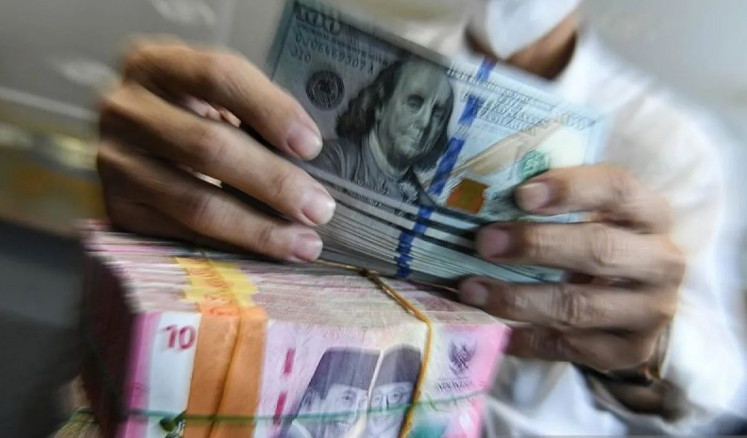Popular Reads
Top Results
Can't find what you're looking for?
View all search resultsPopular Reads
Top Results
Can't find what you're looking for?
View all search resultsCourt rejects judicial review of Papua referendum
The Constitutional Court rejected on Monday a petition for a judicial review of several articles of Law No
Change text size
Gift Premium Articles
to Anyone
T
he Constitutional Court rejected on Monday a petition for a judicial review of several articles of Law No. 12/1969 on the establishment of the West Irian autonomous province and autonomous regencies in West Irian province.
West Irian was the former name of the Indonesian part of Papua Island. The 1969 Law is the legal basis of Papua’s integration with Indonesia after the end of Dutch colonial rule.
The judicial review was filed by dozens of lawyers, academics, Papuan leaders, churches and women’s organizations under the Coalition of Advocates for Truth and Justice in Papua.
They challenged the articles in the law that stipulate the 1969 Act of Free Choice (Pepera) as the manifestation of the people's aspirations made with full awareness. The coalition asserted that only 1,025 of 800,000 Papuans voted in the referendum under Indonesian military pressure.
Reading out its ruling in a hearing presided over by Chief Justice Anwar Usman, the court said the judicial review application was “illogical” as it attempted to review the Act of Free Choice, which was acknowledged by the United Nations General Assembly under Resolution No. 2504 (XXIV).
“To postulate any violation of constitutional rights under the 1969 Papuan referendum is equal to forcing the Constitutional Court to question the legitimacy of the United Nations,” Anwar said, reading the ruling.
Yan Pieter Yarangga, the head of the Papua Customary Council and one of the petitioners, said that the coalition had expected the rejection. He said that the judicial review application was part of the coalition’s larger effort to uncover the history of Papua and raise public awareness on the issue.
“There was a violation against freedom of expression during the 1969 Act of Free Choice,” he said after the court hearing.
He also regretted that any efforts made by Papuans to scrutinize their history and voice their concerns had been labeled by authorities as an act of treason.
“When Papuans express their concern regarding the history of Papua’s integration, the government stigmatizes them with allegations of treason,” he added.
Yan referred to six Papuan activists who are standing trial for treason after they staged a protest in front of the State Palace on Aug. 28, 2019, condemning racist attacks and alleged excessive use of force by security personnel against Papuan students in Surabaya, East Java.
London-based human rights NGO, TAPOL, reported that 84 Papuans were arrested by the Jakarta Police and charged with treason between Aug. 30 and Dec. 3, 2019.
“That [the treason charges] undermines citizens’ constitutional rights. That’s what people need to know,” Yan said.
The Coalition of Advocates for Truth and Justice in Papua filed the judicial review application on Apr. 12, 2019. They believed that the stipulation on the referendum in the 1969 law contradicted Article 281 of the 1945 Constitution, which protects citizens from torture and guarantees freedom to express one's thoughts and to follow one’s conscience.
The 1962 New York Agreement, which became the basis for the 1969 Papua referendum, said all adults in Papua had the right to self-determination and the referendum had to be conducted under international principles of practice.
The coalition believes that the fact that only 1,025 Papuans voted in the referendum contravened the New York Agreement. According to the coalition, Indonesian military operations carried out before the referendum had compelled Papuans to opt to integrate with Indonesia.
Following the court’s decision, the coalition plans to bring the case to international tribunals.
Separately, University of Indonesia international law expert Hikmahanto Juwana was skeptical about the coalition’s plan, saying that the case did not meet any requirements of any international judicial institution.
“The ICJ [International Court of Justice] only settles disputes between states and the ICC [International Criminal Court] charges individuals for international crimes. Meanwhile, the PCA [Permanent Court of Arbitration] facilitates arbitration and disputes between states. So, there is no place, even through international mechanisms,” he told The Jakarta Post.
He further stressed that the coalition needed to have a clear procedure on how to voice its aspirations, otherwise it would meet another dead end.
“It’s good that they have their aspirations and want to educate society about the issue. However, speaking about law enforcement, comprehensive procedures are also needed. Glorifying the substance of the issue is not enough,” he said. (trn)










